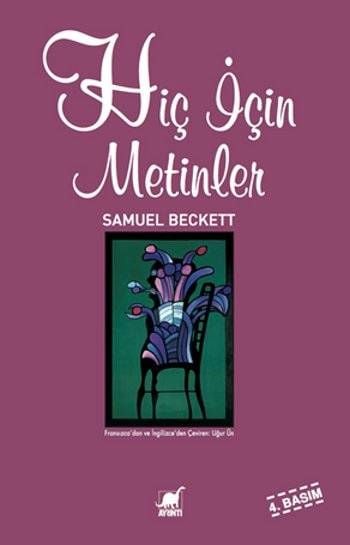
Texts for Never
Irish writer Samuel Beckett stubbornly maintained his understanding of literature, which he defined as "the art of failure/deprivation", from his first poems to his last prose. The concept of "failure/deprivation", which we can explain as "the artist's having to express nothing without knowing the reason and having nothing", is mixed with an intense black humor in his four long stories.
These stories constitute a milestone in Beckett's literary adventure; In addition to being a narrative narrative, First Me is also the first work written by the Irish author in a foreign language (French). Beckett, under the influence of his master Joyce, will explain why he abandoned the agile, connotative-rich English that he used with great skill and wrote in unadorned, almost bare French, as "I want to exclude style". We can also consider these long stories as the precursors of the themes he developed in his masterpiece trilogy (Molloy-Malone Is Dying - The Unnamed): Heroes losing their physical abilities, the split of consciousness, the powerlessness felt in the face of the outside world, being expelled from home and places of residence, the longing for silence and wordlessness, all that the bourgeois society has to offer. Indifference to possibilities... Nothing actually happens in these stories, which do not pay attention to the classical story concept. In Atilmis, the anti-hero spends his day wandering around in a carriage. After staying at the coachman's barn for the night, he decides to continue his idleness alone. First Love tells the strange experience of a young schizophrenic, who aims for a quiet and serene life in his unmanned kingdom, with the opposite sex. Soothing, reminiscent of Malone Dies. The narrator, lying alone in his frozen bed, makes up stories for himself because he is afraid to listen to his decay. Son's hero, released from the mental hospital, pierces the floor with his knife while setting out on the waters in his single-oared boat. In Texts for Nothing, the narrator, who is completely deprived, has lost all his subjective and objective sensations, and does not even have a delusional identity left, continues his discourse full of contradictions and contradictions by "carving out the inside of nothingness". From these texts, Beckett will reach the masterpiece of anti-literature, I Wonder How, in which he will break all kinds of punctuation marks, syntax, in short, all ties with classical literature.
For those who dare to come face to face with this uncompromising author of literature...
( From the Promotional Bulletin)
Number of Pages: 160
Print Year: 2016
< br>Language: Turkish
Publisher: Ayrinti Yayınlari
Number of Pages: 160
First Printing Year: 2009
Language: Turkish
| Publisher | : | Details Publications |
| Number of pages | : | 160 |
| Publication Year | : | 2016 |
| ISBN | : | 9789755392400 |
| The heart | : | Turkish |


